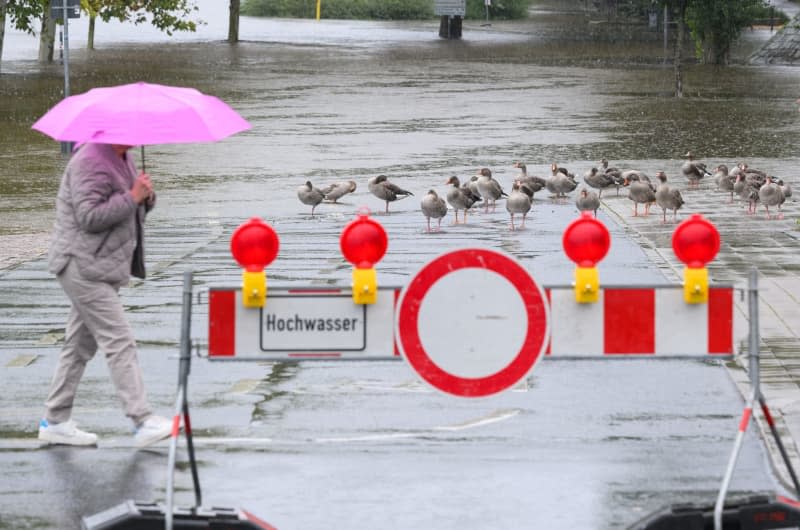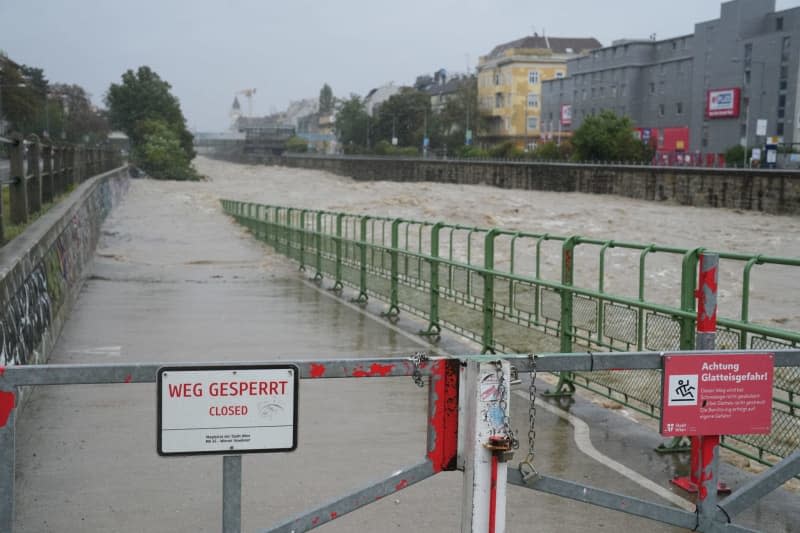Further casualties were reported across Central Europe on Monday as severe flooding continued to overwhelm parts of Austria, Poland and the Czech Republic, with more heavy rains on the way.
The latest victims included two elderly men who died in their homes in the flood-hit state of Lower Austria, which has been declared a disaster zone by the Austrian government.
The flood situation in the eastern region – which surrounds the capital Vienna and borders the Czech Republic – is still serious despite a brief let-up in rain overnight, Governor Johanna Mikl-Leitner said on Monday.
“It is not over, it remains critical, it remains dramatic,” Mikl-Leitner added.
Up to 80 millimetres of rain were expected in the state on Monday, putting significant pressure on the region’s dams.
More than 200 roads in Lower Austria are closed, 1,800 buildings have been evacuated and many pupils were staying at home, she said.
Around 3,500 households are currently without electricity.
In Lower Austria, up to 370 millimetres of rain have fallen in recent days, several times the monthly average of precipitation. A firefighter lost his life while pumping out a basement over the weekend.
The situation could ease somewhat from Tuesday, when an end to the persistent rain is forecast.
However, disruption is likely to continue in the coming days.
Although water levels have receded in Vienna, there were massive public transport problems on Monday.
Most underground lines in the city of 2 million residents were only offering partial service, while the state railway company ÖBB said no trains are currently running from the capital to the south and west of the country.
One dead, seven missing in Czech ‘apocalypse’
The Czech Republic confirmed on Monday its first death from the flooding, while reporting up to seven people missing.
Czech Police President Martin Vondrášek said an individual drowned in the small Krasová river in the eastern Moravian-Silesian region.
Three of those missing are believed to have been trapped in a car when it got caught in a raging river near the spa town of Jesenik, near the border with Poland. There is no trace of the vehicle so far.
The other missing persons are said to have fallen into various bodies of water, such as the Otava river. Additionally, a man from a nursing home near the Polish border is missing.
Czech Prime Minister Petr Fiala has described the situation as a once-in-a-century flood.
Over the weekend, streets in town like Jesenik in the Altvater Mountains, Opava on the river of the same name and Krnov on the border with Poland turned into raging torrents.
In Jesenik, emergency services rescued hundreds of people with boats and helicopters. The mayor of the town said on television: “It was an apocalypse, there is mud everywhere, everything is destroyed.”
The main square in the city centre temporarily turned into a single body of water, with cars floating on it. Several houses collapsed in the region, while authorities reported a risk of landslides after the floodwaters receded.
On the Morava river, entire streets were underwater in Litovel, the CTK news agency reported. Authorities in the small town of almost 10,000 residents appealed to the population to heed the emergency services.
Levels continued to rise in many other places. Evacuation orders have been expanded in Ostrava, the third-largest city in the Czech Republic after dykes were breached. A state of danger was declared for the area around the town of Frýdlant in North Bohemia.
Emergency Cabinet meeting in Poland as Wrocław threatened
The situation remained tense in south-western Poland, as Prime Minister Donald Tusk called an emergency Cabinet meeting for Monday.
Tusk said that he had drafted a decree to declare a state of natural disaster, pending Cabinet approval.
The persistent rainfall has led to widespread flooding in areas near the border with the Czech Republic. One person has been confirmed dead in Poland, with fears the number could rise.
In the small town of Kłodzko in Lower Silesia, entire streets were underwater, with at least one fatality recorded.
The village of Głuchołazy in the Opole region has also been heavily damaged by the floodwaters.
On Sunday night, the town of Nysa in the Opole region was particularly affected. Floodwaters from the Nysa Kłodzka, a tributary of the Oder river, inundated the emergency admissions ward of the local district hospital, according to news agency PAP.
A total of 33 patients, including children and pregnant women, were evacuated to safety using rubber dinghies.
Further downstream, the major western city of Wrocław is preparing to be hit with high water later this week, Mayor Jacek Sutryk said on Monday morning.
There is round-the-clock monitoring of flood dykes as well as the canals and tributaries of the Oder river, which runs through the city, Sutryk said in a video posted to Facebook.
Flooding is currently expected to reach Wrocław on Wednesday, with earlier forecasts suggesting the city could avoid the worst of the weather being revised, the mayor warned.
However, the flooding is not anticipated to reach the level of the catastrophic conditions of 1997, when one-third of the city was inundated.
Casualties in Romania as Orbán cancels obligations
Other countries have also been affected by the historic storm front, with Hungarian President Viktor Orbán announcing on the social media platform X that he has postponed all “international obligations” due to “extreme weather conditions and the ongoing floods in Hungary.”
Germany is also preparing for swollen rivers to bring flooding to its border regions, while the situation in Romania remained tense on Monday after at least six people died in heavy rain and severe flooding over the weekend.
The regions of Galați, Vaslui and Iași in the east of the country were particularly hard hit. About 300 people had to be evacuated, and around 6,000 farmhouses were impacted by the flooding.
The victims are mainly elderly people, including two women aged 96 and 86.
The water mostly affected remote villages, where people climbed onto rooftops to avoid being swept away by the floods.











